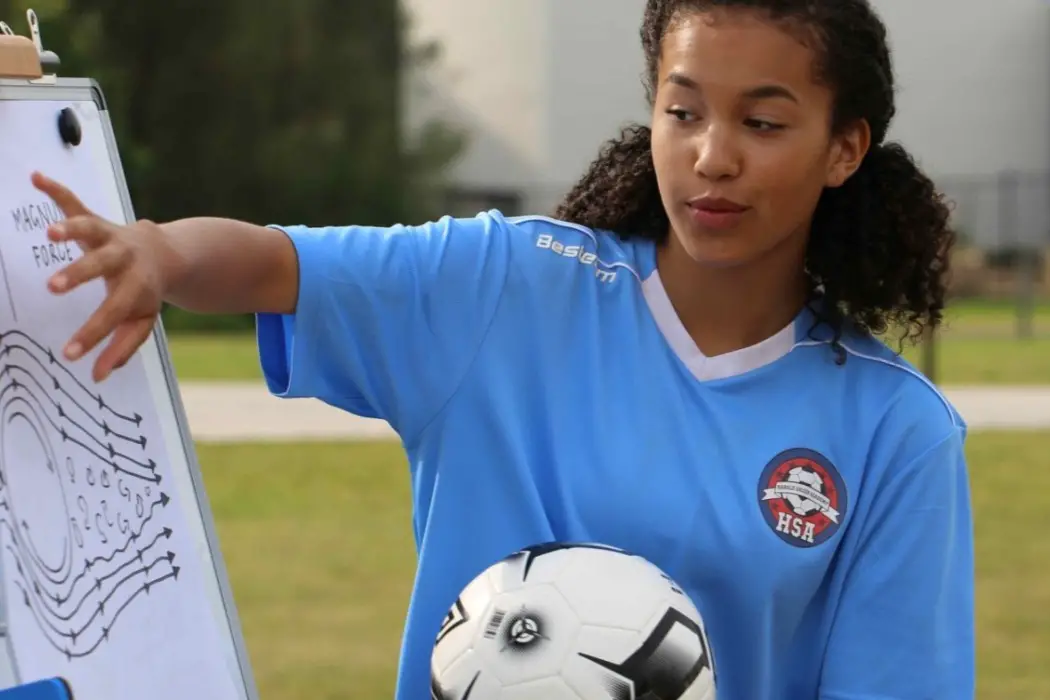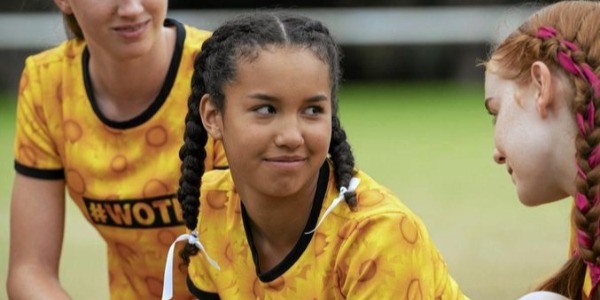BACK OF THE NET: Bargain Bend It Like Beckham

Alex is a 28 year-old West Australian who has a…
“Why does it look like our uniforms are from 1995” Sofia Wylie asks in regards to the archaic soccer shirt she’s been forced to change into. “Because they are from 1995” one of her team-mates swiftly fires back. After sitting through the experience that is Louise Alston’s Back of the Net, it’s not just the uniforms that appear to be dated, Alison Spuck McNeeley and Casie Tabanou’s script has seemingly been saved from the same year, a paperback fossil that would’ve served as formidable fodder during the height of the straight-to-VHS boom of the 90’s.
But in the year 2019, alongside the dirge of children’s entertainment that has become available as another school holiday period begins (Dumbo, The Lego Movie 2 and Wonder Park to name a few) this feel-good soccer flick is purely a wincing reflection into the past, not because of the youthful characters at its core, but because of how utterly old-fashioned it feels. At least if it existed in the 90’s, some of today’s millennials would consider its mediocrity, through a haze of unchecked nostalgia, charming.
Slack of the Net
It’s easy to call Back of the Net mundane and predictable, but this sense of simpleness and predictability should not be taken as criticism in regards to children’s entertainment, as this specific demographic demands security and recognisable formulaic narratives. It’s a type of reliability that exists within adult content as well now; the current wave of superhero films are practically fuelled by this level of dependability, ensuring dwindling cinema attendees that their hard-earned bucks will guarantee them a sufficiently worthwhile time – what matters most is just how these elements are handled.

Familiar formulas provide a safety net, but to draw from my recent viewing of Tim Burton’s reimagined Dumbo, audiences love to be beguiled at the illusion that there is no net; that our heroes may be in danger or the soccer team might lose the championship. But when the material is so transparently rote, so rigidly indebted to a predictable path, then the magic’s gone, and all that is left is a shining spotlight upon that damn net, which in this film’s case, could speak to the adjacent soccer goals that stand outside the hallowed halls of Harold’s Soccer Academy.
A Missed Goal
When precocious American science student Cory Bailey (Disney Channel star Sofia Wylie, a residence that this material clearly belongs to), is all set to attend a prestigious research vessel for the summer that would guarantee her educational future, she makes one fatal mistake when arriving in the sunny side of Sydney. After confusing her travel buses, Bailey shows up at Harold’s Soccer Academy, where, being the type of person who’s more into chemistry than Cricket, finds her fish out of water status intently exasperated – and not just because she’s (literally) missed the boat on her scientific dreams.
After a gaggle of gregarious girls ingratiate her into the cut-throat world of teenage soccer start-ups, which includes snotty rich-kid darling Edie (Tiarnie Coupland) and clear-cut love interest Oliver (Trae Robin), she discovers her untapped talent at the sport, using her keen scientific knowledge to prop-up her rag-tag team, suitably dubbed the “Worst of the Best” and giving them a fighting chance at winning the camp’s end of season championship.

Last year, Mark Grentell delivered a pleasantly charming sports comedy in the form of The Merger, an endearing mixture of ocker oddities and relatable characters within the prism of the typical underdog sports comedy. Rich in resonance, it used its worn story structure to its advantage, forgoing any real narrative divergence to instead invest time in building the small community that its characters inhabited, carefully curating its cast so that we really cheer when that winning goal during the final game is to be kicked. Granted The Merger was more geared for older audiences, and there’s nothing particular wrong about Back of the Net’s young cast (Wylie displays a level of comic awareness that could work wonders in a studio picture), but this is cinematic film-making at its most middling.
Not only is it comfortable with consolidating every single sports movie cliché imaginable within its short 85 minute run-time, but it even lacks the basic merits of what we expect from a movie that is lucky enough to receive theatrical distribution. Its flat television-like aesthetics are amplified significantly when displayed on a 45 foot screen, and its constant deluges into time-crunching montages – each using the exact same “pop” song, in the similar style of Woody Allen’s lazier, late-in-life projects – pass without impact. When working with such tired dramatic structures and characterisations, these creative elements require a refreshing degree of wit and economy to work, and the film’s only attempt at this – quirky on-screen visualisations of Bailey’s scientific hypothesis’ – are simply not enough.
Back of the Net: Conclusion
I don’t think anybody expected anything revolutionary from this independently-financed children’s fable about an Australian soccer camp, but Louise Alston’s Back of the Net fails to generate a single reason to exist. It merely recalls other underdog sports films of the past without an ounce of creative inflection, lacking any pretensions to being more than just an inert distraction for the young ones. It may pride itself in preaching surface-level gestures of believing in yourself and that there’s no “I” in team, but its heavy heartedness rarely disguises the frailty of this basic sports story, a classic example of familiarity breeding contempt, not compassion.
It’s ironic that Back of the Net features a protagonist who operates life through the application of textbook formulas, because she’s stuck in a film that’s chosen to do the same.
Do you have any favourite underdog sports films? Let us know in the comments!
Does content like this matter to you?
Become a Member and support film journalism. Unlock access to all of Film Inquiry`s great articles. Join a community of like-minded readers who are passionate about cinema - get access to our private members Network, give back to independent filmmakers, and more.













